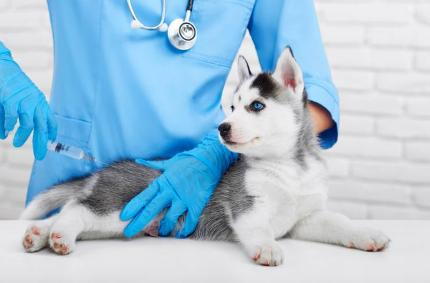
- posted: Jan. 22, 2019
Why Vaccinate?
A question we, as veterinary professionals, receive quite often is why vaccinating is so important, I mean, it’s just a dog or cat, right? Wrong. When you make the choice to adopt or purchase an animal, you are in charge of a furry, adorable, living creature. These animals depend completely on us to take care of their needs, which includes making choices regarding their health. Our pets are so domesticated that they wouldn’t survive alone in the wild anymore. We need to feed them, bring them to the doctor, and be an unconditional friend for them. If we vaccinate our children against certain diseases, why shouldn’t we vaccinate our pets?. Vaccines exist for the safety of your pet and to protect them from disease. Vaccines do not cure a disease process that has already started, but will help prevent a pet from developing a disease when exposed to it.
Many owners wonder why they need to vaccinate their pet if their cat (or dog) remains indoors all day. Even if your pet is inside all the time you still bring them to the groomers or to the vet from time to time. There have even been cases of wildlife entering people’s homes and attacking house-hold pets. If there is another animal at the vet or at the groomers who is sick, having your dog or cat vaccinated will not only prevent them from becoming sick, it will also prevent the disease from being spread further.
Vaccines work by exposing what is called an antigen, or a harmful substance, to the animals body in such a small amount that the animal cannot get sick from it. The animal’s immune system will use antibodies, which work like an army to seek out and attack the harmful substance, or antigen, which is in the animal’s body. In fact, antibodies are so good at what they do that they even create memory cells which remember the antigen and how to fight it off for future exposure. Boosters are required every year in order to ensure that the memory cells still remember what to do.
You are probably already quite aware of all the vaccines available to your dog or cat, but to give you a little extra insight I will go over them quickly again. There are what’s called core vaccines and non-core vaccines available for our canine and feline friends. Core vaccines are the typical vaccines given by all veterinarians that cover the most common diseases your pet may be exposed to. Non-core vaccines cover those that, depending on your lifestyle, your pet may or may not be exposed to.
|
|
Dogs |
Cats |
|
Core |
Rabies (required by law), Distemper, Hepatitis, and Parvovirus |
Rabies (required by law), Panleukopenia, Calicivirus, and Rhinotracheitis |
|
Non-core |
Parainfluenza, Leptospirosis, Lyme Disease, Corona virus, Bordetella, and Giardia |
Feline Leukemia Virus, Ringworm, Chlamydia, Feline Infectious Peritonitis, Bordetella, Feline Infectious Virus, and Giardia |
Yes, that’s right. You are required by law to vaccinate your dogs and cats against rabies. I’m sure you’ve heard on the news that rabies is on the rise, so why not protect your pet and others, by getting them vaccinated. If you would like to vaccinate your pet or have any questions, please call us or book an appointment!
Written by Elizabeth DeBoer, RVT
Lakeshore Road Animal Hospital
2319 Lakeshore Road W, Oakville
289-837-0100
Office Hours
8:00 AM - 8:00 PM
9:00 AM - 2:00 PM
Closed
Location
2319 Lakeshore Rd W.
Oakville, ON L6L 1H2, Canada


